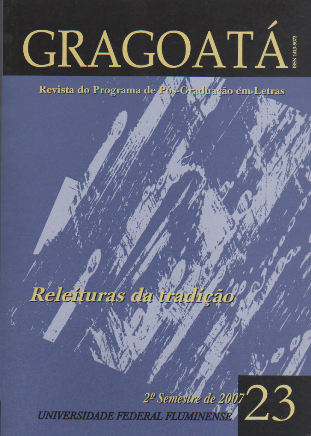Ideograma e pensamento selvagem: a arte e a ciência do yãmîy maxakali
Palavras-chave:
Ideograma. Pensamento selvagem. Maxakali. LiteraturaResumo
Este artigo aborda um gênero de poesia tradicionalmente oral dos índios Maxakali de Minas Gerais. Apresenta a transcriação, nos padrões estabelecidos por Haroldo de Campos, como proposta de tradução dos cantos-poemas indígenas da língua maxakali para a língua portuguesa. Sugere que tais cantos-poemas, ou yãmîys, como são chamados na língua maxakali, apresentam um método ideogrâmico de composição no que tange à teoria do ideograma segundo Ezra Pound, e posteriormente também desenvolvida por Haroldo de Campos. Compara o yãmîy a um gênero, também tradicionalmente oral, de poesia africana, estudado e transcriado por Antônio Risério: o oriki. E, por fim, realiza uma interseção entre a Teoria Literária e a Antropologia, mais especificamente o conceito de pensamento selvagem de Lévi-Strauss, com vistas a reconhecer também o caráter científico imbricado neste tipo de texto.
Downloads
Downloads
Publicado
Edição
Seção
Licença
AUTORIZAÇÃO
Autores que publicam em Gragoatá concordam com os seguintes termos:
Os autores mantêm os direitos e cedem à revista o direito à primeira publicação, simultaneamente submetido a uma licença Creative Commons Atribuição 4.0 Internacional (CC BY 4.0), que permite o compartilhamento por terceiros com a devida menção ao autor e à primeira publicação pela Gragoatá.
Os autores podem entrar em acordos contratuais adicionais e separados para a distribuição não exclusiva da versão publicada da obra (por exemplo, postá-la em um repositório institucional ou publicá-la em um livro), com o reconhecimento de sua publicação inicial na Gragoatá.
A Gragoatá utiliza uma Licença Creative Commons - Atribuição CC BY 4.0 Internacional.











